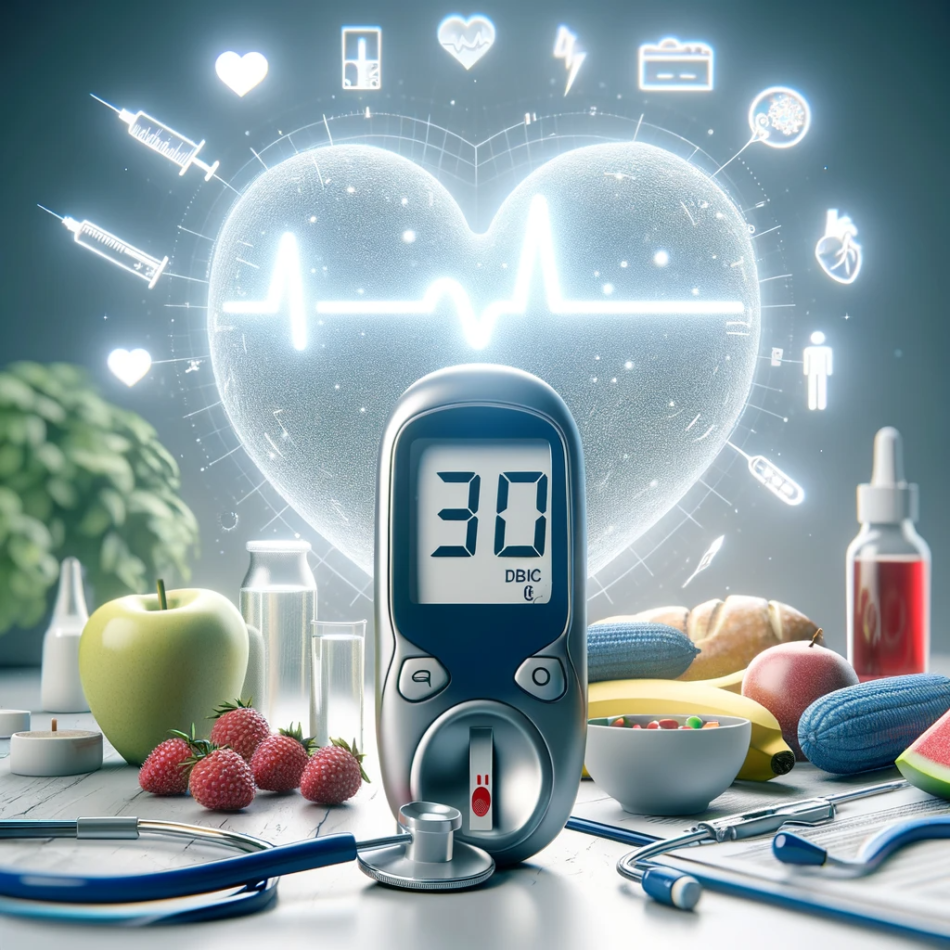Our bodies are intricate systems where various aspects of health are interconnected. Among these interconnected elements, blood sugar plays a central role in regulating numerous bodily functions. In this blog post, we will talk about the fascinating connections between blood sugar and various aspects of our health, including blood pressure, anxiety, headaches, dizziness, COVID-19, weight loss, alcohol, and sleep.
Blood Sugar and Blood Pressure: A Delicate Balance
Blood sugar and blood pressure are closely related, and maintaining the right balance is vital for overall health.
- Blood Sugar’s Role: High blood sugar levels, as seen in uncontrolled diabetes, can damage blood vessels over time, increasing the risk of hypertension (high blood pressure).
- Impact on Blood Pressure: Elevated blood sugar can lead to inflammation and oxidative stress, which can contribute to arterial stiffness and increased blood pressure.
- Managing Blood Sugar: Proper diabetes management through diet, exercise, and medication can help regulate blood sugar levels and reduce the risk of high blood pressure.
Blood Sugar and Anxiety: The Blood Sugar-Brain Connection
Blood sugar fluctuations can affect brain function and mood, potentially contributing to anxiety.
- Hypoglycemia and Anxiety: Low blood sugar (hypoglycemia) can trigger symptoms like shakiness, palpitations, and anxiety, often referred to as “hypoglycemic anxiety.”
- Coping Mechanisms: Managing blood sugar through consistent eating habits and balanced meals can help stabilize mood and reduce anxiety.
Blood Sugar and Headaches: When Sugar Levels Soar and Crash
Blood sugar imbalances, both high and low, can be associated with headaches.
- Hyperglycemia and Headaches: High blood sugar levels can lead to dehydration and trigger headaches in individuals with diabetes.
- Hypoglycemia and Headaches: Low blood sugar levels can result in hypoglycemic headaches, often accompanied by dizziness and confusion.
- Balanced Blood Sugar: Maintaining stable blood sugar levels through regular meals and snacks can help prevent these types of headaches.
Blood Sugar and Dizziness: The Rollercoaster Ride
Blood sugar fluctuations can cause dizziness and lightheadedness.
- Hypoglycemia and Dizziness: Low blood sugar levels can lead to dizziness, which can be dangerous if it results in a fall.
- Orthostatic Hypotension: High blood sugar can affect blood pressure regulation and contribute to orthostatic hypotension, causing dizziness upon standing.
- Balance and Awareness: Staying hydrated and managing blood sugar effectively are essential for preventing dizziness associated with blood sugar fluctuations.
Blood Sugar and COVID-19: A Complex Relationship
The connection between blood sugar and COVID-19 is multifaceted.
- Increased Risk: People with poorly controlled blood sugar are at a higher risk of severe illness from COVID-19.
- Infection Impact: COVID-19 can lead to glucose dysregulation, potentially causing blood sugar spikes.
- Vaccination: COVID-19 vaccination is recommended for individuals with diabetes to reduce the risk of severe infection.
Blood Sugar and Weight Loss: The Key to Healthy Weight Management
Blood sugar levels influence appetite and weight regulation.
- High Sugar and Weight Gain: Diets high in sugary foods and drinks can contribute to weight gain and obesity.
- Insulin Resistance: Insulin resistance, often seen in type 2 diabetes, can make it harder to lose weight.
- Balanced Diet: A balanced diet with controlled portions and regular physical activity can help manage blood sugar and support weight loss.
Blood Sugar and Alcohol: The Double-Edged Sword
Alcohol can affect blood sugar levels, posing challenges for those with diabetes.
- Hypoglycemia Risk: Alcohol consumption, especially on an empty stomach, can lead to hypoglycemia.
- Hidden Calories: Alcoholic beverages can be calorie-dense and contribute to weight gain if not consumed in moderation.
- Monitoring and Moderation: Individuals with diabetes should monitor blood sugar levels when drinking and be mindful of their alcohol intake.
Blood Sugar and Sleep: The Nighttime Connection
Blood sugar levels can influence sleep quality and vice versa.
- Nocturnal Hypoglycemia: Low blood sugar during the night can lead to disrupted sleep, night sweats, and nightmares.
- Poor Sleep and Blood Sugar: Inadequate sleep can impair glucose metabolism and lead to insulin resistance.
- Healthy Sleep Habits: Maintaining a regular sleep schedule and addressing sleep issues can help stabilize blood sugar and improve overall health.
Conclusion:
Understanding the complex web of connections between blood sugar and various aspects of health is crucial for maintaining overall well-being. Whether you’re managing diabetes or simply striving for optimal health, awareness of how blood sugar affects your body and the steps you can take to maintain balance is essential. By making informed choices and working with healthcare professionals, you can navigate these intricate relationships and promote your long-term health and vitality.
-

1 Managing Chronic Conditions: Tips for Older Adults
-

2 Healthy Aging: The Benefits of Regular Social Interaction
-

3 Understanding and Managing Menopause Symptoms Naturally
-

4 Preventing and Managing Diabetes in Later Life
-

5 A Guide to Age-Appropriate Exercise Routines
-

6 Skin Health in Your 60s: Adapting Your Skincare Routine
-

7 Healthy Eating for Heart Health in Older Adults
-

8 The Benefits of Strength Training for Seniors: Building a Stronger and Healthier Tomorrow
-

9 Mental Exercises to Keep Your Brain Sharp
-

10 Managing Blood Pressure Naturally in Your 50s and Beyond


